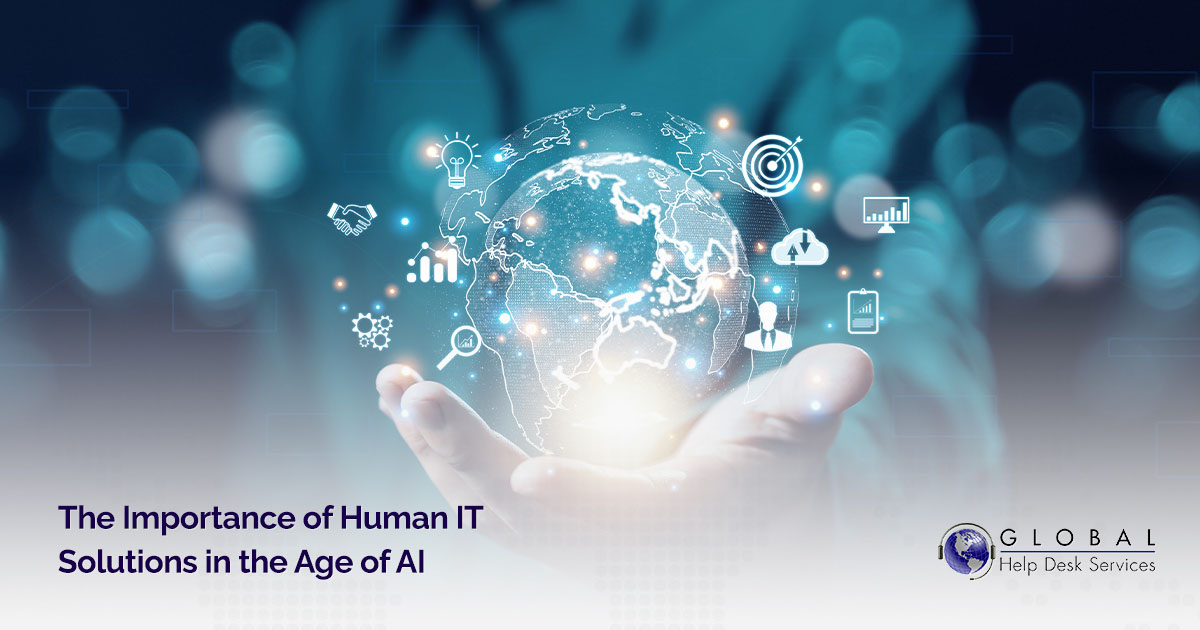When used correctly, AI can be a huge help. An AI chatbot can quickly tell you your co-pay before you head to a doctor’s appointment or point you to the correct aisle to get a flathead screwdriver on your way to the hardware store.
But AI can also be less than helpful. (That same health insurance chatbot could suggest you reduce your stress by recycling your old VCR.) If AI support fails your customers, they’re back where they started: needing a help desk. Except now when they do call, they’re already annoyed —having wasted the time they were promised they’d save.
With sales and reputation on the line, many companies are wondering if there’s a better answer. When artificial intelligence fails, where should human IT solutions bridge the gap?
The Human Touch in Problem Solving
Even in the age of AI, people still prefer to talk to a real, live human being. In fact, 88% of respondents in a 2019 survey said they prefer talking to a person rather than navigating an automated phone menu.
And that’s because humans can do things machines can’t. They can de-escalate situations, ask meaningful follow-up questions, and use empathy or humor to turn an angry caller into a happy one.
Empathy is a skill AI can’t begin to touch. Whether you’re calling an insurance company to get a crucial surgery covered for your child or just frustrated that you can’t remember your password, an impersonal approach could make a bad situation worse. You need to know the person on the other end of the phone understands what you’re going through and will do their best to resolve the situation.
Take that frustrated caller who dialed in after wasting time with AI. They’re annoyed their question wasn’t answered. The agent, being human, can use empathy to read the situation and respond appropriately. Maybe a light joke about the joys of technology will be enough to diffuse the situation. Or, a joke might make things much worse, and the better approach is sympathy. Only a human can “read” another person well enough to make those judgment calls.
The Role of Emotional Intelligence in a Help Desk
But just because a human is on the other end of the phone doesn’t mean your callers are getting a great caller experience.
The best help desk agents have great emotional intelligence or EQ. Unlike intelligence quotient (or IQ), EQ rates how well they understand, use, and manage their emotions in positive ways to communicate effectively, empathize with others, and overcome challenges.
That’s why we prioritize EQ over technical knowledge for our Level One agents.
Technical knowledge can be taught, but emotional intelligence is harder to teach. A computer genius might know everything there is to know about IT, but if the communication is unclear or off-putting, it’s not as helpful as it could be.
Read more: The Pillars of a Successful Support Organization
Active Listening and Personalization
Not every phone call is a life-or-death situation. But even for run-of-the-mill support calls, human IT solutions are crucial to a successful outcome.
- A human agent can use active listening skills to ask the right questions to understand the full context of a situation.
- They can build rapport and trust—fundamental elements for situations that involve sensitive personal information.
- And they can use these skills to understand when an issue needs to be escalated or prioritized.
All these skills make it much more likely an issue will be solved and the person at the other end of the call will rate the experience as positive.
Human Insight and Enhanced Security
The human touch could also save your company from expensive and embarrassing security breaches. Skills like active listening, for example, could help stop fraudsters from gaining access to sensitive information like business email passwords. Fraudsters will go to great lengths to impersonate people, even studying their social media accounts for details that could be the answer to common security questions, like:
- Date of birth
- Hometown
- Mother’s maiden name
- Pet’s name
And that’s when the right training and strong attention to detail can pay off. Here’s an example:
A caller from England needs help resetting his password. He knows all the answers he should and is ready to rattle them off. But after a bit of chit-chat, the agent notices he doesn’t have an accent and casually asks him about it. If the caller seems taken aback and scrambles for an excuse, a savvy agent’s alarm bells should go off.
Agents with the right training can act as your extra layer of security against cyberattacks and fraud.
Read more: Trust but Verify, Picky Questions to Ensure Help Desk Security
The Importance of Personalization
Personalization is another important skill at a help desk. Calling someone by their name during a conversation can increase rapport and signal respect.
But if you’ve ever used a chatbot, you know AI has no trouble repeatedly using your name.
So true personalization goes far beyond that.
It’s about working in the details that let the caller know all the information they’ve given you before hasn’t been ignored. An agent who has mastered friendly personalization might veer from the script and ask a recently traveling employee how the conference went. These side conversations can increase trust and turn a tedious errand into an enjoyable chat.
Personalization goes to an entirely new level when it comes to proactive problem-solving, and is an area where human IT support shines: Seeing the problems, coming up with better ways to deal with them, and anticipating what future-proofing might be needed.
AI is a great tool, but it can’t match the human connection and interpersonal skills a well-trained human IT agent can provide. When a chatbot leaves a customer hanging, the warmth and understanding of a real live person can fill in the gaps and turn a bad experience into a great one. It’s just a matter of finding and nurturing the right skills in your agents, so they can provide the human touch your callers need.
Ready to harness the power of human IT solutions for your help desk? Give us a call. We’d love to chat.


